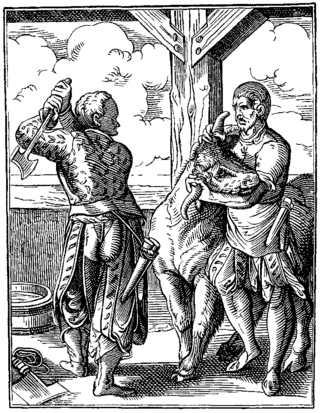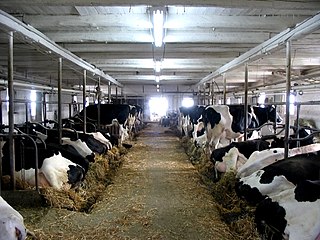
Veal is the meat of calves, in contrast to the beef from older cattle. Veal can be produced from a calf of either sex and any breed; however, most veal comes from young male calves of dairy breeds which are not used for breeding. Generally, veal is more expensive by weight than beef from older cattle. Veal production is a way to add value to dairy bull calves and to utilize whey solids, a byproduct from the manufacturing of cheese.

Cruelty to animals, also called animal abuse, animal neglect or animal cruelty, is the infliction by omission (neglect) or by commission by humans of suffering or harm upon non-human animals. More narrowly, it can be the causing of harm or suffering for specific achievements, such as killing animals for entertainment; cruelty to animals sometimes encompasses inflicting harm or suffering as an end in itself, referred to as zoosadism.

Dairy cattle are cattle bred for the ability to produce large quantities of milk, from which dairy products are made. Dairy cattle generally are of the species Bos taurus.

The meat industry are the people and companies engaged in modern industrialized livestock agriculture for the production, packing, preservation and marketing of meat. In economics, the meat industry is a fusion of primary (agriculture) and secondary (industry) activity and hard to characterize strictly in terms of either one alone. The greater part of the meat industry is the meat packing industry – the segment that handles the slaughtering, processing, packaging, and distribution of animals such as poultry, cattle, pigs, sheep and other livestock.
Animal welfare and rights in Israel is about the treatment of and laws concerning nonhuman animals in Israel. Israel's major animal welfare law is the Animal Protection Law, passed in 1994, which has been amended several times since. Several other laws also related to the treatment of animals: Rabies Ordinance, 1934; Fishing Ordinance, 1937; Public Health Ordinance, 1940; Wildlife Protection Law, 1955; Plants Protection Law, 1956; Criminal Procedure Law, 1982; Animal Disease Ordinance, 1985; National Parks, Nature Reserves, National Sites and Memorial Sites Law, 1991; the Law of Veterinarians, 1991; Dog Regulation Law, 2002; Rabies Regulations (Vaccinations), 2005; and Prohibition on declawing cats unless for reasons vital to the cat's health or owner's health, 2011.
Animal Outlook, formerly known as Compassion Over Killing (COK), is a nonprofit animal advocacy organization based in Washington, D.C. It is headed since May 2021 by Executive Director Cheryl Leahy, who succeeded Erica Meier. Formed in 1995, as a high school club, their primary campaigns are to advocate against factory farming and promote vegan eating. While the group welcomes those who are interested in animal welfare who eat meat, it encourages a transition to a plant-based diet.

Hillside Animal Sanctuary, based in Frettenham, Norwich, and with a site at West Runton, North Norfolk, is the United Kingdom's largest home for different kinds of farm animals and horses. The vegan-run sanctuary is funded entirely on public donations. The sanctuary was established by Wendy Valentine and its patron is actor Martin Shaw.
Be Human is a 1936 Fleischer Studios animated short film starring Betty Boop and Grampy. It is now in the public domain.

Animal slaughter is the killing of animals, usually referring to killing domestic livestock. It is estimated that each year, 80 billion land animals are slaughtered for food. Most animals are slaughtered for food; however, they may also be slaughtered for other reasons such as for harvesting of pelts, being diseased and unsuitable for consumption, or being surplus for maintaining a breeding stock. Slaughter typically involves some initial cutting, opening the major body cavities to remove the entrails and offal but usually leaving the carcass in one piece. Such dressing can be done by hunters in the field or in a slaughterhouse. Later, the carcass is usually butchered into smaller cuts.

Liberation BC is a non-profit animal rights organization based in Vancouver, British Columbia, Canada, founded in 2004. It is run entirely by volunteers, including the board of directors, and has an e-mail network of nearly 4000 supporters. The stated mission of Liberation BC is "to expose animal exploitation through outreach and education, to promote a vegan lifestyle as the most effective and attainable way to protect animals, and to build and provide support for a strong community of effective animal advocates."

Animals Now is an animal rights group based in Israel and founded in 1994. It focuses on exposing cruelty in factory farms, promoting legislation to protect animals, and raising public awareness.
Anuradha Sawhney was the ex- Chief Functionary and the head of Indian operations of People for the Ethical Treatment of Animals (PETA), India. She is an animal rights activist and was the Editor of the Indian edition of the animal rights magazine Animal Times.

Mercy For Animals (MFA) is an international nonprofit animal protection organization founded in 1999 by Milo Runkle. MFA's mission is to "prevent cruelty to farmed animals and promote compassionate food choices and policies."
CraFarms is a group of companies of which Allan, Beth and Frank Crafar were Directors. Crafar Farms was New Zealand's largest family-owned dairy business. The family business owned 22 dry stock and dairy farms with approximately 20,000 cows in various regions of the North Island, and was put into receivership in October 2009. Crafar Farms was involved in multiple prosecutions for pollution offences and incidents of poor animal welfare from 2007 to 2011.

Dairy farming is one of the largest agricultural sectors in Canada. Dairy has a significant presence in all of the provinces and is one of the top two agricultural commodities in seven out of ten provinces.

Animal welfare in New Zealand is governed by the Animal Welfare Act 1999 and a number of organisations actively advocate for both animal welfare and animal rights. Pest control and farming practices have been scrutinised with respect to animal welfare issues. The legality of killing dogs and cats for consumption has also been criticized.
Animal Justice Project is a British animal rights organisation founded in 2014. The NGO advocates for an end to animal agriculture and promotes a vegan lifestyle, conducting undercover investigations on farms, in abattoirs, and places where animals are traded. The organisation claims to have delivered ‘many positive impacts, on thousands of animals’’ though its work.
Animal welfare and rights in Canada is about the laws concerning and treatment of nonhuman animals in Canada. Canada has been considered to have weak animal welfare protections by the organization World Animal Protection. The vast majority of Canadians are for further animal protections, according to a poll conducted on behalf of Mercy for Animals.

This article is about the treatment of and laws concerning non-human animals in Australia. Australia has moderate animal protections by international standards.

Joseph Dominic Armstrong, known professionally as Joey Carbstrong, is an Australian animal rights activist. A former criminal, he has since become an advocate for animal liberation and veganism through social media and public speaking engagements, as well as debates and various televised interviews.












